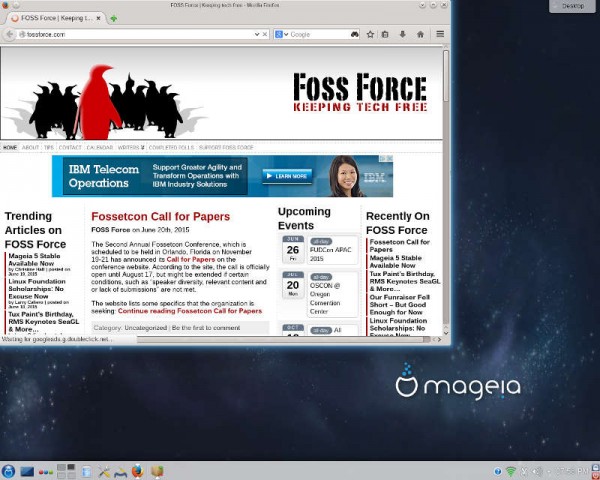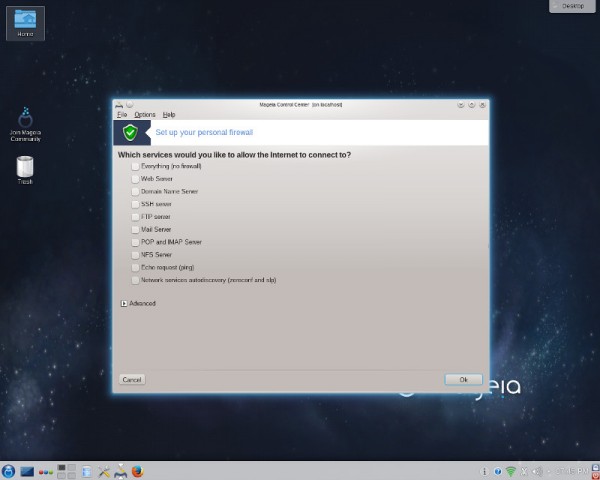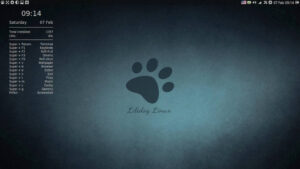In this week’s column we wish Slackware a happy 30th birthday, look forward to the soon to be landing Mageia 9, and get the bugs out of LibreOffice 7.5.5.

Yes, the official name of this column is Friday FOSS Week in Review, although we no longer include the day in the headline. And yes, today is Saturday, not Friday.
So why, I hear you ask, is this column being posted a day late?
Well, for starters, I’m not any happier about working on Saturday than you are about reading the column a day late — if you even really care — so tread lightly, OK?
I did have the day set aside yesterday to get this written and published by about 2 pm, but that didn’t happen. It turns out, that when I sat down to work yesterday, news was breaking about the EU’s Industry, Research, and Energy Committee approving the draft Cyber Resilience Act, which everybody who is anybody says will be bad for open-source. Because of this, my boss (which is me) said that the CRA story took precedence and ordered me to write that article first.
Not wanting to argue with the boss, that’s what I did, so that’s why I’m a day late with this weeks column
I tried to tell the boss that this really doesn’t look good, considering that we just rebooted the column last weekend. I also told her that I don’t care what she says, next week the column goes up on time, no matter what news story is breaking on Friday.
We’ll see how that works out. She’s a mean boss.
Happy 30th Birthday to Slackware
On Sunday July 16, Slackware turned 30, and while it wasn’t the first Linux distro to exist, it’s the oldest that’s still standing.
Similar to Linux, which considers its birthday to be the day that Linus Torvalds sent his famous email, Slackware marks its birthday by a message posted by its founder, Patrick Volkerding, who continues to maintain the distro to this day.
“The Slackware Linux distribution (v. 1.00) is now available for anonymous FTP. This is a complete installation system designed for systems with a 3.5” boot floppy. It has been tested extensively with a 386/IDE system. The standard kernel included does not support SCSI but if there’s a great demand, I might be persuaded to compile a few custom kernels to put up for FTP.
“This release is based largely on the SLS system, but has been enhanced and modified substantially. There are two main disk series, A (13 disks) and X (11 disks).”
I remember installing operating systems using multiple floppies, back in the day. I guess that makes me old.
Anyway, Volkerding posted an announcement on Sunday on Slackware’s Patreon page marking the birthday occasion:
Thirty Years!
Once upon a time in the early days of Linux, after months of tinkering with a customized distribution and putting it online for beta testing, I got the crazy idea to call it stable and to post the announcement linked below starting Slackware on the path to where it is today. To everyone who has contributed in any way along the line, I offer my sincere thanks. So, where are we now? I’m still looking at a few blockers that need to be handled before I can call -current a 15.1 beta, but we’ll get there fairly soon. Thanks for enabling me to keep doing the work I love – this site has really been instrumental. All the best to everyone. 🙂
Pat
On Thursday, Liam Proven wrote a nice Slackware birthday article that was published by The Register that you can read here.
Mageia 9 Coming Soon
On Friday, Mageia released Mageia 9-rc1, according to Michael Larabel at Phoronix. Like Solus, but without the drama, the distro has gotten itself a bit behind for this release cycle, with the original plan being that version 9 would be ready for prime time by the end of 2022. That obviously didn’t happen, but with this release candidate now available for folks to take for a test drive, the official stable release should be just around the corner — Larabel figures within a couple of weeks.
Mageia isn’t nearly as old as Slackware. In fact, in the overall scheme of things it’s not really old at all, having had its first release on June 1, 2011, meaning it just recently turned 12. The distro is based, however, on Mandrake, which saw its first release on July 23, 1998, meaning it would be celebrating its 25th birthday on Sunday if it were still around.
In addition to being the first “easy-to-use” distro, Mandrake was for many folks (including me) their first Linux experience. Mageia is very much like Mandrake — or at least it was.

Click to enlarge
Admittedly, I haven’t looked at Mageia for many years — eight years ago, to be exact, for a review of Mageia 5 — so things might have changed since, but when I did look, it was like taking a trip down memory lane. What really amazed me was that it was still using Mandrake’s “Drake Tools,” which was probably the first way to configure a Linux distro from a GUI instead of having to open a terminal to make changes in a CLI-based text editor.
I’ll definitely have to take a look at Mageia 9 when it’s released. Maybe even write a review from an oldtimer’s perspective.
LibreOffice 7.5.5 Is Here
On Thursday, the folks at The Document Foundation announced the release of LibreOffice 7.5.5 Community, which is the free version of the office software suite which most of us mere mortals use. As you might be able to tell from the numbering, this is the fifth minor release of the LibreOffice 7.5 line.
According to Marius Nestor at 9to5Linux, this one is primarily a bug fix release which addresses a total of 70 bugs.
LibreOffice, of course, is cross-platform, with versions available to download for users running Windows (Intel/AMD and ARM processors), macOS (Apple Silicon and Intel processors), and Linux. For us Linux users, DEB and RPM downloads are available, as well as source tarballs for those of you who want to compile it yourself.
That does it for this week. Right now, I’m going to get started the sixties radio shows that I host each week on the online radio station, The Barrel of Rock (use the link or there’s a player embedded in most pages on FOSS Force). The show is presented in two one hour segments, with the first airing at 6 pm Eastern Time and the other at 6 pm Pacific Time. During one of those hours this week, I’m going to be explaining why some people call Steve Miller the Space Cowboy and some people call him the Gangster of Love.
Anyway, until next week, may the FOSS be with you…
Christine Hall has been a journalist since 1971. In 2001, she began writing a weekly consumer computer column and started covering Linux and FOSS in 2002 after making the switch to GNU/Linux. Follow her on Twitter: @BrideOfLinux









